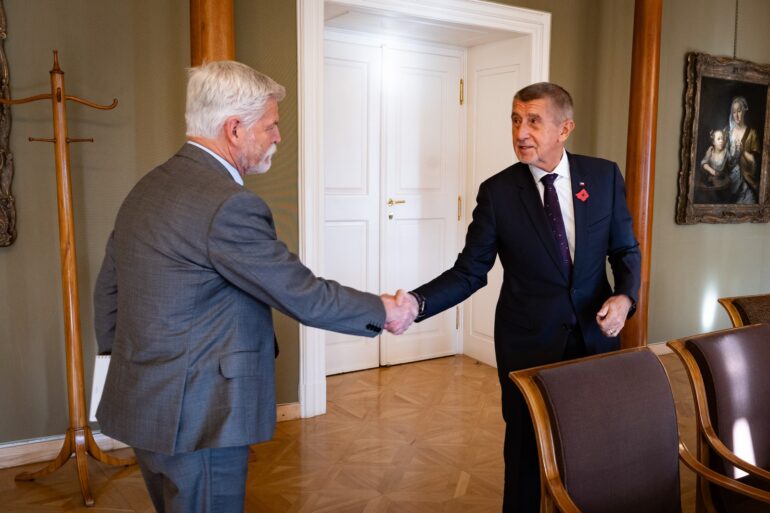Speaking to journalists on Narodni street in the centre of Prague yesterday, Czech President Petr Pavel said that ANO, as the election winner, should offer another candidate for the post of prime minister instead of its leader Andrej Babis, if Babis is unable to resolve his conflicts of interest satisfactorily.
The president said that if Babis did not address the issues with his business interests, then appointing him would be contributing to the creation of an illegal situation.
If Babis owned the Agrofert holding at the time of his appointment as the prime minister, he would be in a conflict of interest, and would have 30 days to resolve it.
Babis said on Thursday that he would declare how he would resolve the conflict of interest just before being appointed as prime minister. Babis added that if the president wished, he would announce it publicly. On Sunday, ANO deputy chair Alena Schillerova said on Czech TV that Babis would take irreversible steps to resolve the conflict of interest, but would not sell Agrofert.
The president said he believed transparency was needed before appointing the prime minister. “I am obliged, also on the basis of the Constitutional Court ruling, to ask Andrej Babis how he will resolve this conflict of interest to avoid dealing with court disputes for the next four years,” he said.
Later on Monday, ANO deputy leader Karel Havlicek told the news server iDNES.cz that Babis is the movement’s only candidate for prime minister.
“We have one candidate and that is Andrej Babis,” said Havlicek. “He is the chair of the party that has clearly won, we have won a record number of votes and have formed a coalition that fully supports Andrej Babis as the head of the government. There is no other option.”
At a meeting on 5 October, Babis presented the president with some options for a solution. These include selling Agrofert, transferring it to a family member, or transferring it to a fund.
“I told him then that these were options that would lead to the elimination of the conflict of interest,” said Pavel. “Andrej Babis interprets this today as an agreement with the solution, but he only told me the options, he did not tell me which one he would take. I cannot say whether I am satisfied with this or not.”
Babis should state the solution publicly, the president said, because there is no reason to hide. He stressed that he did not want Babis to resolve the conflict of interest before the appointment, but only to state his plans transparently for the public to judge.
“If Andrej Babis is unable to resolve his conflict of interest satisfactorily, then I would be contributing to the creation of an illegal situation by appointing him,” Pavel said. “I don’t think the public expects me to do that, certainly not the constitution. In that case, it would probably be a good idea for the winner of the election to offer another candidate who is not in a conflict of interest.”
“Andrej Babis is obliged to explain how he will deal with the conflicts of interest and eliminate them,” said outgoing Czech PM and Civic Democrat (ODS) leader Petr Fiala, responding to the president’s statement.
Fiala said that the conflict of interest is not only a moral issue, but also a practical one. “Andrej Babis’s companies already received about CZK 7 billion in subsidies during the last period when he was the prime minister, which they must pay back. This is the money that should have gone to citizens or other companies that were entitled to it. That is a serious matter. It is impossible for us to get into a similar situation again.”
Babis is currently in the process of forming a new cabinet of ANO, Freedom and Direct Democracy (SPD) and the Motorists.
SPD head Tomio Okamura, the speaker of the lower house of parliament, stressed that Babis was not currently in a conflict of interest under Czech law, but would be only with his appointment (as PM), and would have to resolve it within 30 days.
“In my opinion, the president should proceed in accordance with the law and with the democratic outcome of the election, that is, appoint the winner of the election as the prime minister, and then the legal deadline of 30 days comes into play,” Okamura told journalists yesterday.
Petr Macinka, leader of the Motorists, said yesterday he could not understand the president’s “games”.
“Andrej Babis said several days ago that he would publicly announce how he would resolve [his conflict of interest] just before his appointment. I assume it will be in line,” said Macinka, without elaborating.
If Babis does not address his conflicts of interest within the law, some economists, experts and opposition politicians believe the Czech Republic could face restrictions or even suspension of EU subsidies as a result.
Babis put the Agrofert shares into two trust funds in February 2017 to meet the amended conflict of interest law. However, he retained his influence in both funds. Then, in October this year, he confirmed that he had once again become the sole owner of Agrofert and was taking steps to avoid a conflict of interest.
The parliamentary groups of the outgoing government parties, KDU-CSL, ODS, STAN and TOP 09, together with their former partner Pirates, have handed over a request for the lower house speaker to convene an urgent session on Babis’s conflict of interest.
The applicants have gathered about 90 signatures on the list, with 40 being needed to call a session of the 200-seat Chamber of Deputies.
Based on the rules of procedure, Speaker Tomio Okamura (SPD), must convene the session to take place within ten days. He told reporters on Friday that he expected the session to be held between 25-28 November.







